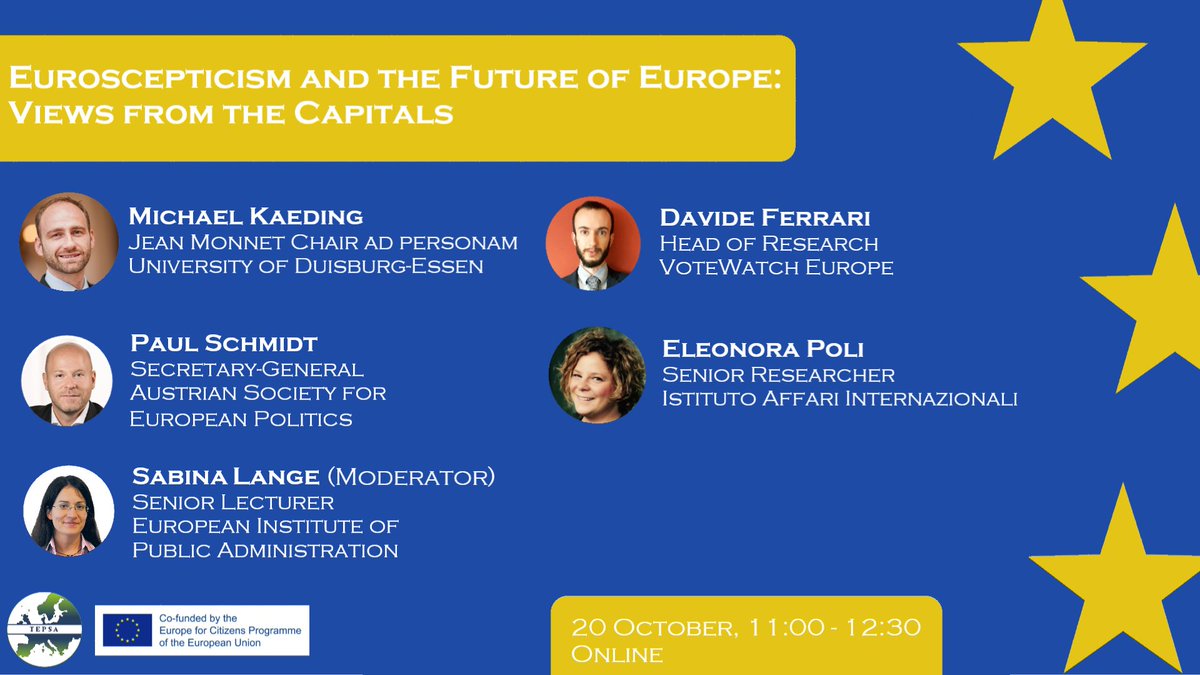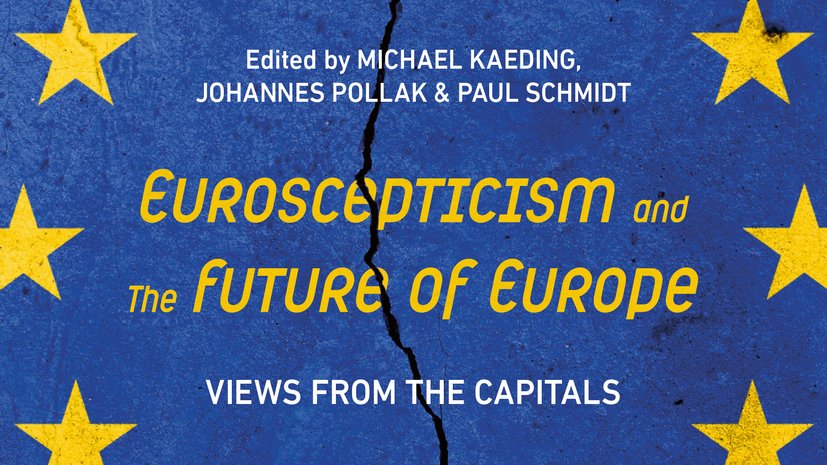
We're beginning our online event discussing the #FutureofEurope with @JuhaJokela1, @MichaelKaeding, and @Europarl_EN representatives @othmar_karas, @HeidiHautala, and MEP @miapetrakumpula
As always, we'll be highlighting the best bits here
/THREAD
As always, we'll be highlighting the best bits here
/THREAD

Our moderator Jarmo Oikarinen from @EP_Suomi welcomes us all to the debate, introducing our speakers @JuhaJokela1 (@FIIA_fi), @MichaelKaeding (@unidue), MEP @miapetrakumpula, and @Europarl_EN Vice-Presidents @othmar_karas and @HeidiHautala
/2
/2
The basis of today's discussions is the new TEPSA book "Euroscepticism and the Future of Europe: Views from the Capitals"
Check out the book here: tepsa.eu/tepsa-books/
/3
Check out the book here: tepsa.eu/tepsa-books/
/3
Our first speaker is the book's co-editor @MichaelKaeding from @unidue, who co-edited the book along with @_PaulSchmidt (@oegfe) and @JohannesPollak (@WebsterVienna), who highlights the ongoing project of publishing TEPSA books on the #FutureofEurope discussion
/4
/4
"It's a landscape of different forms of criticism, and not all of that criticism should be taboo: we all do very well in embracing the idea of constructively criticising the European Union as we move into the future. Not all criticism in Eurosceptic"
- @MichaelKaeding
/5
- @MichaelKaeding
/5
"#Euroscepticism is not something to be found only on the right. We find it across the political spectrum is the majority of countries"
- @MichaelKaeding from @unidue
/6
- @MichaelKaeding from @unidue
/6
"Euroscepticism has always been around, and it is not only a problem in countries which joined later: we have forms of Euroscepticism from the very beginning to European integration. It is part of European integration, and it is here to stay"
- @MichaelKaeding from @unidue
/7
- @MichaelKaeding from @unidue
/7
"Euroscepticism is a cleavage within the left and right, both in the European Parliament and in national parliaments. We find this in particular in The Netherlands, where we find Eurosceptic parties across the political spectrum"
- @MichaelKaeding from @unidue
/8
- @MichaelKaeding from @unidue
/8
Our next speaker, giving his expertise on Euroscepticism in Finland, is @JuhaJokela1 from @FIIA_fi
/9
/9
.@JuhaJokela1 from @FIIA_fi wrote the chapter on Euroscepticism in Finland in "Euroscepticism and the Future of Europe: Views from the Capitals" AND contributed to the TEPSA Explainers series on the same topic back in the summer
Check out the video!
tepsa.eu/tepsa-explaine…
/10
Check out the video!
tepsa.eu/tepsa-explaine…
/10
"Security was the key driver of the Finnish membership of the EU, perhaps even more than the economy"
- @JuhaJokela1 from @FIIA_fi
/11
- @JuhaJokela1 from @FIIA_fi
/11
"While we have a lot of EU support in Finland, we also have a strong Eurosceptic populist party, The Finns Party, which became so powerful that it was included in government in 2015...
/12
/12
... This led to a drop in popularity, a schism within the party, and a repositioning as opposition. In 2019 it became the second largest party in the country by focusing on domestic discussion of migration and climate policy"
- @JuhaJokela1 from @FIIA_fi
/13
- @JuhaJokela1 from @FIIA_fi
/13
"Despite this domestic focus fo The Finns Party in 2019, their Euroscepticism became latent, but did not go away, ready to re-emerge in the context of a new European crisis: with #COVID19, the economic recovery package gave the context for that re-emergence"
- @JuhaJokela1
/14
- @JuhaJokela1
/14
"In view of #CoFoE which will bring citizens back to the European project, I would like to thank the editors and the experts in the member institutes for their important work in shedding light on Euroscepticism across Europe"
- @othmar_karas, @Europarl_EN Vice-President
/16
- @othmar_karas, @Europarl_EN Vice-President
/16
"It is much easier to blame the European Union than to make the case for Europe; it is much easier to take a national perspective than to discuss common solutions"
- @othmar_karas, @Europarl_EN Vice-President
/17
- @othmar_karas, @Europarl_EN Vice-President
/17
"The problem is not the citizens, it is the messaging of the governments of the Member States about the European Union and their role within the European Union. We need to explain and communicate Europe at the European level"
- @othmar_karas, @Europarl_EN Vice-President
/18
- @othmar_karas, @Europarl_EN Vice-President
/18
Now we welcome @Europarl_EN Vice-President @HeidiHautala: "'Towards Meaningful Criticism of the EU' should be our daily exercise"
/19
/19
"There is nothing like the European Union in the world. I hope that the #CoFoE will open the EU up to the citizens, but we still have a lot of work to do until the EU takes it's place in the world of the citizens' lives"
- @Europarl_EN Vice-President @HeidiHautala
/20
- @Europarl_EN Vice-President @HeidiHautala
/20
"This happens after every summit: the good things are claimed as the achievements of the national government, the bad things are blamed on the EU by those same national governments"
@Europarl_EN Vice-President @HeidiHautala
/21
@Europarl_EN Vice-President @HeidiHautala
/21
"I predict with the election of @JoeBiden and @KamalaHarris that Prime Minister @BorisJohnson will no longer be able to play up to #Trump's anti-EU actions. The President-elect and Vice-President-elect will change EU-US relations"
- @Europarl_EN Vice-President @HeidiHautala
/22
- @Europarl_EN Vice-President @HeidiHautala
/22
"I trust very much that the EU can convince it's national governments that the EU can take a leadership place in the world to save the planet along with its allies"
- @Europarl_EN Vice-President @HeidiHautala
/23
- @Europarl_EN Vice-President @HeidiHautala
/23
"It is difficult, of course, to get anti-Europe actors on board, but there is good work to be done in making sure we bring those onboard who criticise us for not doing enough: we can improve"
- @miapetrakumpula, MEP with @TheProgressives
/25
- @miapetrakumpula, MEP with @TheProgressives
/25
.@miapetrakumpula, MEP with @TheProgressives, praises to @SebDance for pointing out that the end of Freedom of Movement that goes along with #Brexit means not only that immigration to the UK will slow, but also that British citizens themselves will lose that freedom
/26
/26
After our initial presentations from @MichaelKaeding, @JuhaJokela1, @othmar_karas, @HeidiHautala, and @miapetrakumpula, we open the floor to questions from our audience
/27
/27
"We may be diverse - United in Diversity - but we have common problems, common solutions, common values, and more. The issues that unite us are much more than the issues that divide us"
- @othmar_karas, Vice-President of @Europarl_EN
/28
- @othmar_karas, Vice-President of @Europarl_EN
/28
After such an engaging Q&A session, we turn back to our expert speakers for their final comments on the more global value of renewing Europe for the future through the upcoming #CoFoE
/29
/29
.@JuhaJokela1 from @FIIA_fi: "This discussion is exactly what we need to bring a European perspective to our national debate"
/30
/30
.@MichaelKaeding from @unidue: "The future is Europe, that has become very clear: there have been so many transnational citizens' dialogues already happening all over Europe. This is exactly what Europe is and should be"
/31
/31
Our moderator Jarmo Oikarinen from @EP_Suomi now takes the opportunity to thank our speakers @JuhaJokela1 (@FIIA_fi) and @MichaelKaeding (@unidue), as well as our special guests from the @Europarl_EN: @othmar_karas, @HeidiHautala, and @miapetrakumpula (MEP @TheProgressives)
/32
/32
All of which concludes our online discussion: “Debating the Future of Europe: Towards Meaningful EU Criticism”, co-organised between @FIIA_fi, @EP_Suomi, and TEPSA, discussing the TEPSA book "Euroscepticism and the Future of Europe: Views from the Capitals"
/ENDS
/ENDS
@threadreaderapp please unroll
• • •
Missing some Tweet in this thread? You can try to
force a refresh





